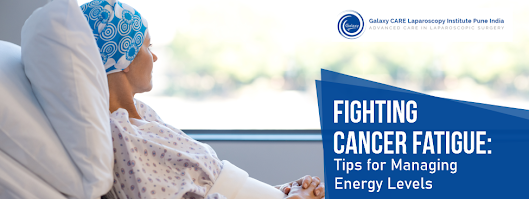Fighting Cancer Fatigue: Tips for Managing Energy Levels
Introduction: Cancer, a formidable opponent in itself, often comes with a slew of side effects, one of the most debilitating being fatigue. This fatigue isn't like ordinary tiredness—it's an overwhelming sense of weariness that can make even the simplest tasks feel like climbing a mountain. However, there are strategies and techniques available to help manage this exhaustion and improve quality of life during cancer treatment. In this blog, we'll explore some effective tips for combating cancer fatigue and reclaiming energy levels.
Understanding Cancer Fatigue: Fatigue is a common side effect of cancer and its treatments, affecting up to 90% of patients at some point during their journey. It can persist even after treatment ends, impacting daily activities and diminishing overall well-being. Cancer-related fatigue is not solely physical but can also have emotional and cognitive components, making it a multifaceted challenge to overcome.
Tips for Managing Cancer Fatigue:
- Prioritize Rest: Listen to your body and prioritize rest when needed. Allow yourself to nap during the day if you're feeling exhausted, and aim for a consistent sleep schedule at night to promote better restorative sleep.
- Stay Active: While it may seem counterintuitive, staying physically active can help combat fatigue. Engage in light exercises such as walking, yoga, or tai chi, tailored to your energy levels and physical abilities. Regular exercise can boost energy, improve mood, and enhance overall well-being.
- Conserve Energy: Learn to conserve your energy by pacing yourself throughout the day. Break tasks into smaller, manageable segments and alternate between periods of activity and rest. Delegate tasks when possible and don't hesitate to ask for help from friends and family.
- Maintain a Balanced Diet: Eating a well-balanced diet rich in fruits, vegetables, whole grains, and lean proteins can provide essential nutrients to support your body's energy needs. Stay hydrated by drinking plenty of water throughout the day, and limit consumption of caffeine and sugary foods, which can cause energy crashes.
- Manage Stress: Chronic stress can exacerbate feelings of fatigue and diminish overall well-being. Practice stress-reduction techniques such as deep breathing, meditation, mindfulness, or engaging in hobbies and activities you enjoy. Consider seeking support from a therapist or counselor to cope with the emotional challenges of cancer.
- Seek Support: Don't hesitate to reach out for support from healthcare professionals, support groups, or online communities. Connecting with others who understand what you're going through can provide comfort, encouragement, and practical tips for managing fatigue.
- Communicate with Your Healthcare Team: Keep your healthcare team informed about your fatigue levels and any changes in your symptoms. They can offer personalized recommendations and may adjust your treatment plan or prescribe medications to alleviate fatigue.
Conclusion: Managing cancer-related fatigue requires a multifaceted approach that addresses physical, emotional, and cognitive aspects of exhaustion. By incorporating strategies such as prioritizing rest, staying active, conserving energy, maintaining a balanced diet, managing stress, seeking support, and communicating with your healthcare team, you can effectively combat fatigue and improve your quality of life during cancer treatment. Remember, it's essential to listen to your body, be patient with yourself, and celebrate small victories along the way. With perseverance and support, you can navigate through cancer fatigue and reclaim your energy levels.



Comments
Post a Comment